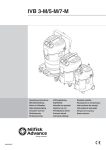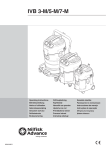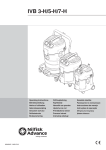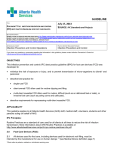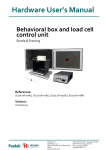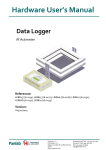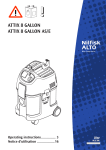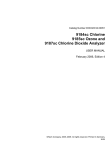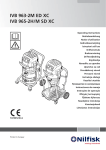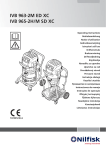Download Nilfisk-Advance America IVB 3-H User's Manual
Transcript
IVB 3-H/5-H/7-H auto auto auto auto auto Operating Instructions Betriebsanleitung Notice d’utilisation Gebruiksaanwijzing Istruzioni sull’uso Driftsinstruks Bruksanvisning 302002027 C Driftsvejledning Käyttöohje Navodilo za uporabo Uputstvo za rad Prevádzkový návod Provozní návod Instrukcja obsługi Kezelési utasítás Ðóêîâîäñòâî ïî ýêñïëóàòàöèè Instrucciones de manejo Instruções de operação Οδηγίες λειτουργίας Ýþletme kýlavuzu IVB 3-H IVB 5-H IVB 7-H IVB 3-H 10 3 1 11 14 9 3 auto 4 5 6 8 IVB 5-H 10 1 7 14 9 3 auto auto 4 5 6 1 IVB 7-H 8 2 10 7 14 9 3 auto auto 4 5 12 8 5 6 12 13 IVB 3-H IVB 5-H IVB 7-H english Contents 1 Important safety instructions ............................................................................................2 2 Description 2.1 2.2 Purpose ................................................................................5 Operating elements ..............................................................5 3 Before start-up 3.1 Assembling the cleaner ........................................................6 4 Operation 4.1 4.1.1 4.1.2 4.1.3 4.2 4.2.1 4.2.2 4.2.3 4.3 4.4 4.5 4.6 Connections .........................................................................6 Connecting the suction hose ................................................6 Electrical connection ............................................................6 Connecting electrical appliances ..........................................7 Switching on the vacuum cleaner .........................................7 Switch position “I” .................................................................7 Switch position „auto“ ...........................................................7 Suction power control ...........................................................7 Check volume flow monitor ..................................................7 Acoustic warning ..................................................................8 Cleaning the filter element (IVB 3-H)....................................8 Cleaning the filter element (IVB 5-H/7-H) .............................8 5 Applications and techniques 5.1 Techniques ...........................................................................9 5.1.1 Picking up dry substances....................................................9 5.1.2 Picking up liquids..................................................................9 6 After finishing work 6.1 Switching the vacuum cleaner off and storage ...................10 7 Maintenance 7.1 7.2 7.2.1 7.2.2 7.2.3 7.2.4 7.2.5 7.2.6 Maintenance plan ...............................................................10 Maintenance work ..............................................................11 Replacing the waste bag ....................................................11 Replacing the filter bag.......................................................11 Replacing filter element „H“ (IVB 3-H) ................................12 Replacing filter element „H“ (IVB 5-H/7-H) .........................12 Emptying dirt tank (IVB 3-H/5-H)........................................13 Emptying dirt tank (IVB 7-H) ..............................................13 8 Troubleshooting 9 Further information ..........................................................................................14 9.1 9.2 9.3 9.4 9.5 9.6 Recycling the vacuum cleaner ...........................................15 Guarantee ..........................................................................15 Tests and approvals............................................................15 Technical data ....................................................................16 Accessories ........................................................................16 EC declaration of conformity ..............................................16 01 IVB 3-H IVB 5-H IVB 7-H english 1 Important safety instructions Symbols used to mark instructions Before using the vacuum cleaner, always read the operating instructions and keep them read- This symbol is used to mark safety instructions that must be observed to prevent damage to the vacuum cleaner and its performance. This symbol is used to mark safety instructions that must be observed to prevent damage to persons. This symbol indicates tips and instructions to simplify work and to ensure safe operation. Only allow the vacuum cleaner to be used by persons who have been trained in its use and who have been explicitly authorized to use it. lations. Besides the operating instructions and the binding accident prevention regulations valid in the country of use, observe recognized regulations for safety and proper use. ily available. For your own safety Despite its simple handling the vacuum cleaner is not suitable for children. Do not use any unsafe work techniques. The use of the vacuum cleaner is subject to valid national regu- Purpose and intended use The vacuum cleaners described in this operating manual are suitable for – commercial use, e.g. in hotels, schools, hospitals, factories, shops, offices and rental businesses. – for separation of any kind of dust with exposure limits, including carcinogenic dust and hazardous dust (dust class H). Permanent filters should be replaced by a specialist only in suitable rooms (e.g. contamination stations). The following materials should not be picked up by the vacuum cleaner: - 02 hot materials (burning ciga- - - rettes, hot ash, etc.) flammable, explosive, aggressive liquids (e.g. petrol, solvents, acids, alkalis, etc.) flammable, explosive dust (e.g. magnesium or aluminium dust, etc.) When dust removers are used, the rate at which air is exchanged in the room must be adequate if the exhaust air from the vacuum cleaner is blown into the room (please observe regulations valid in your country). Before starting work, the operating staff must be informed on - use of the vacuum cleaner - risks associated with the material to be picked up - safe disposal of the picked up material. IVB 3-H IVB 5-H IVB 7-H Precautions and safety regulations when using the vacuum cleaner Dust Class H (high). The dusts which belong to this class are: dusts with OEL values, all carcinogenic dusts and dusts which are mixed with pathogenic agents. Vacu- ums for Dust Class H are tested in their entirety and have a maximum degree of permeability of 0.005%. The disposal must be dust free. Before start-up Electrical components Inspect power cord regularly to detect signs of damage, e.g. cracks or ageing. Check the rated voltage of the vacuum cleaner before connecting it to the mains supply system. Ensure that the voltage shown on the rating plate corresponds to the voltage of the local mains power supply. If the power cord is damaged, it must be replaced by Nilfisk-Advance-Service or an electrician to avoid danger before use of the vacuum cleaner is continued. Use only the type of power cord specified in the operating manual. Do not damage the power cord (e.g. by moving over it or pulling or crushing it). Disconnect the power cord by pulling the plug only (do not pull or tug the power cord). Inspect the vacuum cleaners to ensure that they are in proper condition. Plugs and couplings in power cords must at least have splash protection. Never use the vacuum cleaner if the filter element is damaged. Picking up liquids If foam develops or liquid emerges, stop work immediately and empty the dirt tank. Regularly clean the built in float (IVB 3-H) and level indicator hose (IVB 5-H/7-H) to limit the water level and check that they are not damaged. english If you are using an extension cord, use only those specified by the manufacturer or higher quality ones (see section 9.4 „Technical data“). It is recommended that the vacuum cleaner should be connected via a residual current circuit breaker. This stops the supply of electricity if the leakage current to earth exceeds 30 mA for 30 ms or it has an earth tester circuit. When using an extension lead, check the minimum cross-sections of the cable: Cable length Cross section m <16 A <25 A up to 20 m ø1.5mm² ø2.5mm² 20 to 50 m ø2.5mm² ø4.0mm² Arrange the electrical parts (sockets, plugs and couplings) and lay down the extension lead so that the protection class is maintained. Never spray water on to the upper section of the vacuum cleaner. Danger for persons, risk or short-circuiting. Observe the latest edition of the IEC regulations. See section 5 for information on handling liquids and (hazardous) dust. 03 IVB 3-H IVB 5-H IVB 7-H english Tool socket Use the socket on the vacuum cleaner for the purpose defined in the operating instructions only. Before plugging an appliance into the appliance socket: 1. Switch off the vacuum cleaner Maintenance, cleaning and repair Only carry out maintenance work described in the operating instructions. Always pull out the mains plug before cleaning and maintenance of the vacuum cleaner. During maintenance and cleaning, handle the vacuum cleaner in such a manner that there is no danger for maintenance staff or other persons. In the maintenance area – use filtered compulsory ventilation – wear protective clothing – clean the maintenance area so that no harmful substances get into the surroundings. Before removing the vacuum cleaner from the area contaminated with harmful substances: – clean the outside of the vacuum cleaner, wipe it clean or Accessories and spare parts 04 Use only the brushes supplied with the vacuum cleaner or specified in the operating manual. The use of other brushes can adversely affect safety. 2. Switch off the appliance to be connected. CAUTION! Follow the operating instructions and safety instructions for appliances connected to the power tool socket. pack the vacuum cleaner in well sealed packaging – and avoid spreading deposited harmful dust. During maintenance and repair work all contaminated parts that could not be cleaned satisfactorily must be: – packed in well sealed bags – disposed of in a manner that complies with valid regulations for such waste removal. A dust test must be performed at least once every year by NilfiskAdvance service or a trained person. This test includes, for example, whether there is damage to the filter, the vacuum cleaner is sealed to the air and the control equipment works properly. Use only original Nilfisk-Advance accessories and spare parts (see section 9.5). The use of other parts can adversely affect safety. IVB 3-H IVB 5-H IVB 7-H english 2 Description 2.1 2.2 Purpose Operating elements The vacuum cleaners IVB 3-H/ IVB 5-H/IVB 7-H are suitable to pick up dry, nonflammable dust, nonflammbale liquids, sawdust and hazardous dusts with maximum room concentration values, carcinogenic dusts and other dusts containing germs (dust class H). To pick up dust with maximum room concentration values use the filter bag. See fold-out page at the front of these operating instructions. 7 8 9 10 11 1 2 3 4 Handle Suction pipe support Accessory holder Applicance switch with suction power control 5 Retaining clamp 6 Dirt tank 1) Option depending on model To pick up harmless dust use the waste bag. See section 9.5 “Accessories” for ordering number. Grip to empty tank1) Inlet fitting Appliance socket Cable hook Operating knob for filter cleaning1) 12 Tank locks 13 Castor with brake 14 Hose diameter setting 05 IVB 3-H IVB 5-H IVB 7-H english 3 Before start-up 3.1 Assembling the cleaner 1. Open the retaining clamps and lift off the upper section of the cleaner. 2. Take the accessories out of the dirt tank and the packaging. 3. To pick up dust with maximum room concentration values: Insert the filter bag into the dirt tank according to the instructions (instructions included). To pick up harmless dust: Insert the disposal bag (instructions included) into the tank. IMPORTANT: Press the filter bag connection firmly on to the inlet fitting. 4. Fit the upper section of the vacuum cleaner and close the retaining clamps. NOTE: Ensure that the retaining clamps fit properly. CAUTION! On delivery some of the accessories are lying in the tank and must be removed before the vacuum cleaner is used for the first time. Remove the upper section of the vacuum cleaner: The mains plug should not be inserted into a socket. 4 Operation 4.1 Connections 4.1.1 Connecting the suction hose 4.1.2 Electrical connection 06 1. Connect the suction hose. The suction hose diameter must suit the position of the switch in order to pick up dry, nonflammable dust with maximum room concentration values. The operating voltage shown on the rating plate must correspond to the voltage of the mains power supply. 1. Ensure that the vacuum cleaner is switched off. 2. Insert the power cord into a properly installed and fused socket with an earthing contact. IVB 3-H IVB 5-H IVB 7-H 4.1.3 Connecting electrical appliances To comply with regulations, only approved dust producing tools should be connected. The maximum power consumption of the connected power tool is stated in section 9.4 “Technical data”. Switching on the vacuum cleaner 4.2.1 Switch position “I” Hose ø ø27 ø32 ø38 ø50 27 0 50 The hose diameter and the setting for the suction hose diameter must be the same. 0 36 2 0 3 4.2 0 1. Turn the switch to position „I“. The vacuum cleaner motor starts. Before switching the switch to position „auto“, ensure that the tool connected to the appliance socket is switched off. 3 0 3 2 0 27 0 50 The hose diameter and the setting for the suction hose diameter must be the same. 0 Hose diameter setting ø27 ø32 ø38 ø50 27 Check volume flow monitor 0 0 50 0 2 36 0 3 4.2.3 Suction power control 4.3 english Hose diameter setting ø27 ø32 ø38 ø50 4.2.2 Switch position „auto“ Hose ø ø27 ø32 ø38 ø50 1. Ensure that the electrical appliance is switched off. 2. Connect the electrical appliance to the appliance socket on the control panel. Before picking up dust with maximum room concentration values: 1. Turn the switch to position „auto“. The vacuum cleaner motor starts when the connected appliance is switched on. 2. When the power tool is switched off the vacuum cleaner continues to run for a short moment so that any dust in the suction hose is conveyed to the safety filter bag. The motor speed and the suction power can be varied with the suction power control. This allows precise adaptation of the suction power for different cleaning tasks. 1. Check that all the filters are present and properly fitted. 2. When the motor is running, hold the suction hose shut. An acoustic warning sounds after approx. 1 second. 07 IVB 3-H IVB 5-H IVB 7-H english 4.4 Acoustic warning 4.5 Cleaning the filter element (IVB 3-H) NOTE: If the acoustic signal sounds again after repeated cleaning, replace the filter element (see section 7.2.3). For safety reasons, an acoustic warning sounds if the air speed in the suction hose drops to below 20 m/s. See section “Troubleshooting”. 1 0 auto I 2 x3 Push & Clean Filter Cleaning System Only after picking up harmless dust using the waste bag. If suction performance drops: 1. Set the suction power to maximum. 2. Close the nozzles or suction hose opening with the palm of your hand. 3. Press the button to start filter 4.6 Cleaning the filter element (IVB 5-H/ IVB 7-H) To ensure that suction performance is always at its best, the filter element is automatically cleaned during operation. We recommend complete cleaning if the filter element becomes extremely dirty. NOTE: If the acoustic signal sounds again after repeated cleaning, replace the filter element (see section 7.2.4). 08 cleaning three times. The resulting stream of air removes attached dust from the slats of the filter elements. Only after picking up harmless dust using the waste bag. 1. Switch off the vacuum cleaner 2. Close the nozzles or suction hose opening with the palm of your hand. 3. Turn the switch to position „I“ and let the cleaner operate for approx. 10 seconds with the suction hose opening closed. IVB 3-H IVB 5-H IVB 7-H 5 Applications and techniques 5.1 Techniques If used correctly, additional accessories, suction nozzles and suction hoses can enhance the cleaning action and reduce the cleaning effort. english Effective cleaning is achieved if you follow just a few guidelines in combination with your own practical experience in special fields. Here are some basic tips. 5.1.1 Picking up dry substances CAUTION: Do not pick up flammable substances. ries” for ordering number. Disposal of the picked up material is then simple and hygienic. The suction hose diameter must suit the position of the switch in order to pick up dry, nonflammable dust with maximum room concentration values. After picking up liquids, the filter element is wet. A damp filter element clogs more quickly when dry substances are picked up. For this reason the filter element should be washed and dried or replaced by a dry element before dry substances are picked up. There must always be a safety filter bag in the tank before dry substances with maximum room concentration values are picked up. See section 9.5 “Accessories” for ordering number. To pick up harmless dust we recommend the use of a waste bag. See section 9.5 “Accesso- 5.1.2 Picking up liquids CAUTION: Do not pick up flammable substances. The use of a separate filter element or filter screen is recommended. Before liquids are picked up, always remove the filter bag/waste bag and check that the float (IVB 3-H) or the water level limit (IVB 5-H/7-H) works properly. (See section 7.2.3 and 7.2.4 “Replacing the filter element“.) If foam appears, stop work immediately and empty the tank. To reduce the amount of foam, use foam killer Nilfisk-Advance Foam Stop (see section 9.5 „Optional Accessories“ for order number). 09 IVB 3-H IVB 5-H IVB 7-H english 6 After finishing work 6.1 Switching the vacuum cleaner off and storage 1. After picking up hazardous dust, vacuum clean the outside of the cleaner. 2. Switch off the vacuum cleaner and pull the mains plug out of the socket. 3. Remove the suction hose form the vacuum cleaner and close the inlet fitting (1) with the plug (2). 4. Wind up the power cord and hang it on the handle. 5. Empty the tank and clean the vacuum cleaner. 6. After picking up liquids: Store the upper section of the cleaner separately so that the filter element can dry. 7. Store the vacuum cleaner in a dry room where it is protected from unauthorized use. IVB 3-H 2 1 IVB 5-H IVB 7-H 7 Maintenance 7.1 Maintenance plan After finishing work 7.2.1 Replacing the waste bag 7.2.2 Replacing the safety filter bag 7.2.3 Replacing filter element „H“ (IVB 3-H) 7.2.4 Replacing filter element „H“ (IVB 5-H/7-H) 7.2.5 Emptying dirt tank (IVB 3-H/IVB 5-H) 7.2.6 Emptying dirt tank (IVB 7-H) 7.2 Maintenance work 7.2.1 Replacing the waste bag 1 2 Only after picking up harmless dust. 10 As required IVB 3-H/IVB 5-H: 1. Open the retaining clamps and remove the upper section of the cleaner from the dirt tank. 2. Carefully remove the waste bag connection (1) from the inlet fitting. 3. Close the waste bag connection with the slide (2). 4. Close the waste bag using the cable binder (3). IVB 3-H IVB 5-H IVB 7-H 3 5. Dispose of the dirt in accordance with legal regulations. 6. Insert a new filter bag into the cleaned tank as described in the instructions enclosed. english IMPORTANT: Press the filter bag connection firmly on to the inlet fitting. IVB 7-H: 1. Remove the upper section of cleaner from the dirt tank. 2. Open the retaining clamps (1) and remove the intermediate ring (2) from the tank. 3. Close the waste bag using the cable binder (3). 4. Dispose of the dirt in accordance with legal regulations. 5. Insert a new filter bag into the cleaned tank as described in the instructions enclosed. IMPORTANT: Press the filter bag connection firmly on to the inlet fitting. 2 1 1 3 7.2.2 Replacing the safety filter bag 1 2 During the following work, ensure that dust is not unnecessarily spread around. Wear a P2 breathing mask. 3 1. Clean the filter element (see 4.5 and 4.6). 2. Switch off the vacuum cleaner and wait approx. 5 minutes so that the dust can settle in the tank. 3. Open the retaining clamps and remove the upper section of the cleaner from the dirt tank. 4. Remove the filter bag connection (1) from the inlet fitting. 5. Close the safety filter bag connection (2) with the slide. 6. Remove the plastic sleeve from the tank rim and close it using a cable binder (3). 7. Remove the safety filter bag from the tank and dispose of it in accordance with legal regulations. 8. Insert a new safety filter bag into the tank according to the instructions (in the filter bag packaging). IMPORTANT: Press the filter bag connection on the inlet fitting as far as possible. 11 IVB 3-H IVB 5-H IVB 7-H english 7.2.3 Replacing filter element „H“ (IVB 3-H) Never use the vacuum cleaner without a filter. During the following work, ensure that dust is not unnecessarily spread around. Wear a P2 breathing mask. 1. Clean the filter element (see 4.5). 2. Switch off the vacuum cleaner and wait approx. 5 minutes so that the dust can settle in the tank. 1 3 2 4 6 5 7.2.4 Replacing filter element „H“ (IVB 5-H/7-H) During the following work, ensure that dust is not unnecessarily spread around. Wear a 3. Open the retaining clamps and remove the upper section of the cleaner from the dirt tank. Lay the upper section of the cleaner down with the filter element facing upwards. 4. Using the enclosed tool (2), turn the filter holder (1) anticlockwise and remove it. 5. Place the protective filter bag over the filter element (3). 6. Carefully remove the filter element and close the protective filter bag with a knot. 7. Clean the filter seal (4). Check it for damage and replace it if necessary. 8. Check the antistatic clamp (5) for damage and have it replaced by Nilfisk-Advance Service if necessary. 9. Fit a new filter element. 10.Check that the float (6) works properly. When the filter holder is turned, the float inside must move about easily. 11.Using the enclosed tool, attach the filter holder and turn it clockwise to lock it. 12.Dispose of the used filter element in accordance with legal regulations. P2 breathing mask. Never use the vacuum cleaner without a filter. 1. Remove the upper section of cleaner from the dirt tank. Lay the upper section of the 2. 3. 4. 1 5. 3 2 4 6. 7. 12 cleaner down with the filter element facing upwards. Do not place the upper section of the cleaner on the guard (1) and do not damage the filter element. Unscrew the screw (2), open the bar handle and remove it. Remove the filter holder (3). Place the protective filter bag over the filter element. Carefully remove the filter element and close the protective filter bag with a knot. Clean the filter seal (4). Check it for damage and replace it if necessary. Check the antistatic clamp (5) for damage and have it replaced by Nilfisk-Advance Service if necessary. IVB 3-H IVB 5-H IVB 7-H 6 7 5 7.2.5 Emptying dirt tank (IVB 3-H/IVB 5-H) 8. Check that the control flap (6) for filter cleaning works properly. The control flap should move back and forwards easily. 9. Clean the level hose (7). 10.Fit a new filter element. 11.Fit the filter holder. Ensure that it is in the correct position. 12.Fit bar and close bar handle. 13.Dispose of the used filter element in accordance with legal regulations. english 1. Remove the upper section of cleaner from the dirt tank. 2. Using one hand, take hold of the dirt tank underneath and tip out the dirt. 3. Dispose of the dirt in accordance with legal regulations. 4. Clean the rim of the tank before fitting the upper section of cleaner. Before reinserting the suction hose: 5. Clean the inlet fitting and hose collar. Only after picking up harmless dust without a filter bag. 7.2.6 Emptying the dirt tank (IVB 7-H) 2 1 1 3 Only after picking up harmless dust without a filter bag. To empty the dirt tank after picking up liquids: remove the intermediate ring as a proper seal is only ensured during suction. After emptying the tank: clean the rim of the tank and the seals in the intermediate ring and the upper section of cleaner before refitting them. If the seal or groove is dirty or damaged, the suction performance will 4 4 5 5 1. Remove the upper section of cleaner from the dirt tank. 2. Open the retaining clamps (1) and remove the intermediate ring (2) from the tank. 3. Pull the lever in the handle (3) upwards and tilt the tank. 4. Tip out the collected dirt. 5. Dispose of the dirt in accordance with legal regulations. or: 3. Open the tank locks (4). 4. Use the handles (5) to lift the tank out of the frame. 5. Tip out the collected dirt. 6. Place the empty tank in the frame and close the locks (4). 7. Dispose of the dirt in accordance with legal regulations. be reduced. Before reinserting the suction hose: clean the inlet fitting and hose collar. 13 IVB 3-H IVB 5-H IVB 7-H english 8 Troubleshooting Fault ‡ Motor does not start Remedy > Fuse of the mains socket has • blown. Connect mains fuse. > Overload protection has tripped. switch • Switch off the vacuum cleaner and allow it to cool for approx. 5 minutes. If the cleaner cannot be started again, contact the Nilfisk-Advance service department. > Self-acting carbon brush is • worn. Have carbon brushes changed by Nilfisk-Advance Service. ‡ Motor does not run in auto- > Power tool is defective or not • matic mode connected properly. Check that the power tool works or that the plug is inserted correctly. > The power rating of the elec- • trical tool is too low. Note that minimum power rating is P>40W ‡ The acoustic warning > Suction power selected with • sounds. (Reduced suction suction power control is too power) low. Set suction power in accordance with section 4.2.3. „Setting suction power“. > Hose diameter is not right for • switch position. Set correct switch position for hose diameter. > Clogged suction hose/nozzle. • Clean suction hose/nozzle > The safety filter bag is full. • See section 7.2.2 „Replacing filter bag“. > Filter element is clogged. • See section 4.5 „Cleaning filter element“ and 7.2.3 „Replacing filter element“. > Defective cleaning mechanism • Contact Nilfisk-Advance Service ‡ No suction power during > Tank is full. (Float is blocking • wet cleaning the suction opening). Switch off the cleaner. Empty the tank. ‡ The vacuum cleaner swit- > Tank is full. ches off during wet cleaning • Switch off the cleaner. Empty the tank. > Impedance of power supply is • too high. Connect the cleaner to another socket closer to the fuse box. Voltage fluctuations over 7% should not occur if the impedance at the transfer point is ≤ 0.15 Ω . ‡ Voltage fluctuations 14 Cause IVB 3-H IVB 5-H IVB 7-H english 9 Further information 9.1 Recycling the vacuum cleaner Make the old cleaner unusable immediately. 1. Unplug the cleaner and cut the power cord. Do not discard of electrical appliances with household waste. and electronic appliances, used electrical goods must be collected separately and recycled ecologically. Contact your local authorities or your nearest dealer for further information. As specified in European Directive 2002/96/EC on old electrical 9.2 Guarantee Our general conditions of business are applicable with regard to the guarantee. Subject to change as a result of technical advances. 9.3 Tests and approvals The vacuum cleaners have been tested as specified in IEC/EN 60335-2-69 including appendix AA. All the requirements were fulfilled for equipment in dust class H. The vacuum cleaners must be inspected regularly in accordance with national accident prevention regulations (in Germany as specified in VBG 4 and DIN VDE 0701 Part 1 and Part 3, at regular intervals and after repairs or modifications). A dust test must be performed at least once every year by the manufacturer or a trained person. This test covers, for example, whether there is damage to the filter, the vacuum cleaner is sealed to the air and the control equipment works properly. 15 IVB 3-H IVB 5-H IVB 7-H english 9.4 Technical data IVB V Hz A W 230 3-H GB 230/240V 230/240 16 13 W 2400 1800 560 2400 1800 560 2400 1800 560 W l/min mbar/kPa 3600 3000 1760 3600 3000 3600 230/23 1760 3600 3000 1760 EU Voltage Mains frequency Fuse Power consumption Connected load for appliance socket Total connected load Air flow rate Vacuum Measurement area sound pressure level at a distance of 1 m, EN 60704-1 Sound level Power cord: Length dB(A) 62 dB(A) m 59 Power cord: Type 9.5 EU 230 16 EU 230 16 7-H GB 230/240V 230/240 GB 110V 110 13 16 57 H07BQF3G1.5 H05RR- F3G1.5 H07BQF3G1.5 H05RR- F3G1.5 H07BQF3G1.5 I IP X4 l mm mm mm kg EN 55014-1 45 476 506 655 14 27 380 390 570 10 Minimum air flow volume l/min 27 32 38 50 690 970 1360 2360 Optional accessories Description 9.6 IVB 3-H Order No. IVB 5-H IVB 7-H 302001910 302001143 302001912 302001310 302000462 302001311 302001480 302001137 30082 15475 302001370 – 302001371 8469 70 580 605 970 27 Associated negative pressure between suction hose/tool Pa 16300 15700 13900 7800 EC declaration of conformity EC declaration of conformity NILFISK-ADVANCE A/S Sognevej 25 DK-2605 Brøndby Product: Vacuum cleaner for wet and dry operation Model: IVB 3-H/5-H/7-H Description: 110/230-240 V~, 50/60 Hz, 1200 W, Dust class H The design of the appliance corresponds to the following pertinent regulations: EC Machine Directive 98/37/EC EC Low Voltage Directive 73/23/EC EC EMC Directive 2004/108/EC Applied harmonized standards: EN 12100-1, EN 12100-2 EN 60335-1 EN 60335-2-69 EN 55014-1, EN 55014-2, EN 61000-3-2 Applied national standards and technical specifications: DIN EN 60335-1 DIN EN 60335-2-69 Jørgen Jensen 16 GB 110V 110 60 Suction hose diameter mm Safety filter bag (5 pcs.) Waste bag (5 pcs.) Filter element „H“ Protective filter bag (10 pcs.) Filter screen Cloth insert filter Nilfisk-Alto-Foam-Stop (6 x 1 l) 5-H GB 230/240V 230/240 50/60 13 1200 7.5 H05RR- F3G1.5 Protection class Type of protection (splash water protected) Radio interference level Tank volume Width Depth Height Weight GB 110V 110 Brøndby, 04.07.2005 Nilfisk-Advance A/S Sognevej 25 DK-2605 Brøndby Denmark Tel.: +45 43 23 81 00 Fax: +45 43 43 77 00 www.nilfisk-advance.com



















